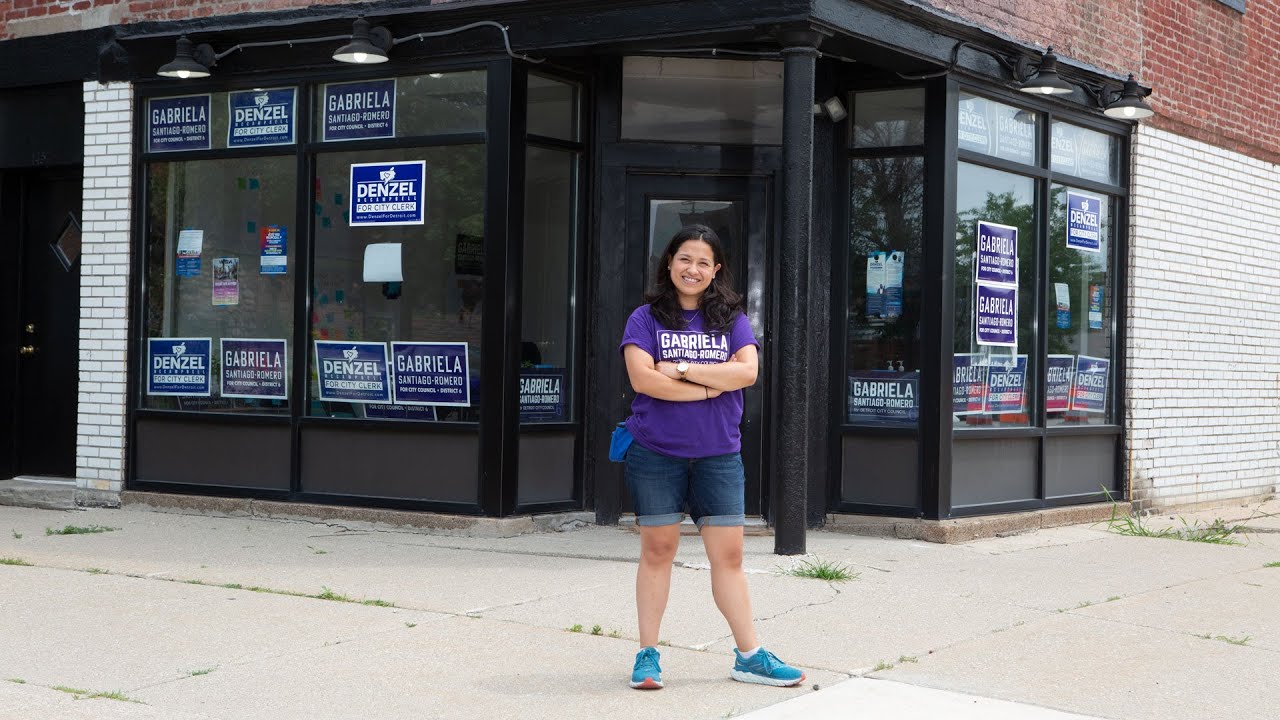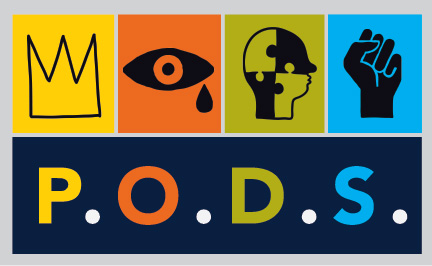
Gabriela Santiago-Romero, MSW '18, speaks about her experience at U-M and her run for Detroit City Council in District 6.
Watch the video.
Policy & Political Social Work
The Policy & Political Social Work pathway prepares students to use the political system to create social change. Students learn theories and principles behind socially just policies, develop methods and skills to analyze policy, and study how politics impact the lives of those that they serve, on both a micro and macro level. They advocate on behalf of people from underserved, underrepresented and marginalized groups, addressing policies that impact communities and empower others to become politically engaged to further social justice. Students will develop the skills to run and hold public office.
Careers
Political social workers are employed by nonprofit organizations and government agencies to enact large-scale social change. Political social workers are also elected officials. Political social workers accomplish social change through legislation, education and other interventions.
- Elected Official
- Campaign Manager
- Legislative Aide
- Constituent Services Specialist
- Lobbyist
- Civil Servant
- Policy Analyst
- Government Relations Specialist
Social workers bring important perspectives to elected office. We center justice and equity in our policymaking, having seen firsthand how laws impact vulnerable communities
Kathy Ki Tran, MSW ‘03 and Virginia House of Delegates Member
Field Experience
In the MSW program, some of the most important learning occurs outside of the classroom. Field placement is a supervised internship at an organization that provides the hands-on, real-world training portion of the curriculum. Field placements might include:
- Political Offices
- Professional Associations
- Advocacy Groups
- Legal Offices
- Government Agencies
- Community Organizations
Program Details
Policy & Political Social Work Pathway Course Requirements
Essentials
- SW505: Engaging Social Justice, Diversity, and Oppression in Social Work, 3 credits
- SW506: Essentials of Interpersonal Practice, 4 credits
- SW507: Research Basics for Social Work Practice, 1 credits
- SW508: Essentials of Social Welfare Policy, 3 credits
- SW509: Essentials of Community and Organizational Practice, 3 credits
- SW590: Introduction to Social Work Practice, 1 credits
- SW649: Practicing Policy with Current Events, 1 credits
- SW678: Program Evaluation and Applied Research, 3 credits
- SW699: Social Work Capstone, 1 credits
Pathway Requirement
- SW638: Theories and Principles of Socially Just Policies, 3 credits
- SW639: Methods for Socially Just Policy Analysis, 3 credits
- SW640: Political Social Work, 3 credits
Please see course planning worksheets for a full list of courses associated with this pathway.
Competencies for Policy & Political Social Work
University of Michigan's School of Social Work (U-M SSW) is accredited by the Commission on Accreditation (COA), of the Council on Social Work Education (CSWE). Accreditation is a system of recognizing educational programs as having a level of performance and quality that gain them the confidence of the educational community and the public. You can read more about the Educational Policy and Accreditation Standards here.
At U-M SSW, each pathway has specialized competencies that describe the knowledge, values, skills, and cognitive and affective processes that comprise the competency in each pathway area.
1. Demonstrate Ethical and Professional Behavior
Social workers demonstrate the ability to apply ethical social work principles and critical thinking to products and work produced. Social workers understand the role of emotional intelligence and professional resilience in professional and ethical practice. Social workers understand the role of other professionals when engaged in interprofessional teams within their areas of specialization. Social workers recognize the importance of life-long learning and ways that supervision and consultation can support continued development.
Practice Behaviors:
- Utilize supervision and consultation to guide professional decision-making.
- Demonstrate emotional intelligence in practice and professional situations.
- Utilize effective communication strategies appropriate to context.
2. Engage Diversity and Difference in Practice
Social workers understand the role of policy and politics in promoting an equitable and diverse society. Students in this specialization will learn to assess policies for their impact on marginalized populations and advance policies that ensure equitable access to resources, opportunities, and services. Social workers also learn skills to promote the political engagement of those that they work with and serve to strengthen community voice in decision-making processes.
Practice Behaviors:
- Develop skills for identifying potential intended and unintended consequences of policies on various populations, including marginalized groups
- Develop skills to engage various populations and communities in political and decision-making processes.
3. Advance Human Rights and Social, Economic, and Environmental Justice
Social workers understand the role of policy in advancing and restricting fundamental human rights such as freedom, safety, privacy, an adequate standard of living, health care, and education. Social workers understand the global interconnections of oppression and human rights violations, and are knowledgeable about theories of human need and social justice and strategies to promote social and economic justice and human rights through engagement in policy and political work. Social workers understand how engagement in policy advocacy can support strategies aimed at eliminating oppressive structural barriers to ensure that social goods, rights, and responsibilities are distributed equitably and that civil, political, environmental, economic, social, and cultural human rights are protected.
Practice Behaviors:
- Apply skills for understanding social, economic, and environmental justice to advocate for human rights at the individual, community, and policy levels
- Engage in practices that advance social, economic, and environmental justice.
4. Engage in Practice-informed Research and Research-informed Practice
Social workers understand the importance of utilizing research to guide their practice and the value of engaging in research through contributing their practice experience. Social workers explore theoretical frameworks that inform policy development, policy advocacy, policy analysis, and political engagement to inform their practice as well as effectively consume relevant research. Through this specialization, students will develop competence in both qualitative and quantitative research methods necessary to engage in professional practice.
Practice Behaviors:
- Use and translate research to inform practice
- Apply critical thinking to policy analysis and political engagement
- Use, translate, and critique political and economic frameworks when developing and analyzing policy and engaging in the political process
5. Engage in Policy Practice
Social workers understand how to analyze, formulate, and advocate for policies that advance human rights and social, economic, and/or environmental justice through the application of critical thinking skills. Social workers are able to identify how current events are linked to policy issues, how to critically analyze and understand policy implications, and apply strategies to engage in policy practice that effect change and advocate for clients.
Practice Behaviors:
- Identify how current events are linked to policy issues impacting clients and client systems.
- Analyze the implications of policy across service systems.
- Identify strategies to engage with policy to advocate for clients and client systems.
6. Engage with Individuals, Families, Groups, Organizations, and Communities
Social workers understand how social workers as practitioners in policy and political settings engage with individuals, families, groups, organizations, and communities. Social workers are knowledgeable about the role of intersectional identity and diversity among constituent groups and the impact of this diversity in political organizing as well as the development and implementation of social policy.
Practice Behaviors:
- Develop strategies for effective engagement across diverse groups and settings
- Apply knowledge about intersectional identity and diversity to policy analysis and development and political engagement
7. Assess Individuals, Families, Groups, Organizations, and Communities
Social workers understand how social workers as practitioners in policy and political settings assess individuals, families, groups, organizations, and communities in ways that are socially just and anti-oppressive. Social workers understand how to locate, identify, and apply relevant research, theories, and policies to inform their practice. Social workers are knowledgeable about the role of intersectional identity and diversity among constituent groups, and the impact of this diversity in political organizing as well as the development and implementation of social policy.
Practice Behaviors:
- Develop skills for using and interpreting assessment and research to develop policy and political strategies that reflect the goals of individuals, families, groups, organizations, and communities
8. Intervene with Individuals, Families, Groups, Organizations, and Communities
Social workers understand how social workers as practitioners in policy and political settings intervene with individuals, families, groups, organizations, and communities. Social workers understand how to locate, identify, and apply relevant research, theories, and policies to inform their practice. Social workers are knowledgeable about the role of intersectional identity and diversity among constituent groups, and the impact of this diversity in political organizing as well as the development and implementation of social policy.
Practice Behaviors:
- Develop skills to formulate policy and political strategies that reflect the goals of individuals, families, groups, organizations, and communities
9. Evaluate Practice with Individuals, Families, Groups, Organizations, and Communities
Social workers understand how social workers as practitioners in policy and political settings evaluate practice with individuals, families, groups, organizations, and communities. Social workers understand how to locate, identify, and apply relevant research, theories, and policies to inform their practice. Social workers are knowledgeable about the role of intersectional identity and diversity among constituent groups, and the impact of this diversity in political organizing as well as the development and implementation of social policy.
Practice Behaviors:
- Develop skills to evaluate policy and political strategies so that they reflect the goals of individuals, families, groups, organizations, and communities
- Critically analyze, monitor, and evaluate policies and political strategies to improve practice
The graduate courses listed below have been taken by previous MSW students or have been identified as being of possible interest to students in this pathway and can be taken to fulfill Pathway Required Electives. On the course planning worksheet, information regarding Pathway Required Electives is included.
There are many other courses not listed below that may be of interest and may also meet the elective requirement. If you identify a pathway-related course not listed below that you want to take to meet your Pathway Required Electives (rather than simply an elective), please contact the Technical Advisors ([email protected]) for approval.
Interest in courses numbered below 500 should be checked for graduate-level status since many are offered for undergraduate credit only. You can check this by contacting the department offering the course or contacting the SSW registrar ([email protected]).
In addition, some courses may be restricted, require prerequisites, not be open to social work students, and/or require instructor permission. If you encounter problems registering for these courses, please contact the department offering the course. The SSW registrar will not be able to assist with registration in outside courses because these courses are not offered by the SSW.
The courses listed below are offered in various semesters. To see if a course is offered in the term you are interested please check the SSW list of outside courses, the website of the department offering the course, or the Wolverine Access Class Search page.
If you want to use one of these non-School of Social Work courses to fulfill the Policy & Political Social Work Required Electives (SWrPP), you will need to fill out a course substitution to receive approval. In the "Rationale for Substitution" box you should reference this page.
Afroamerican & African Studies
- CAAS 426 - Urban Redevelopment
Anthropology - Cultural
- ANTHRCUL 558 - Current Issues in Sociocultural Anthropology
Economics
Education
- EDUC 555 - Financial and Legal Policies for Schools
- EDUC 628 - Issues in Education Policy
- EDUC 771 - K-16 Pathways Policy Seminar
Health Behavior & Health Education
- HBEHED 622 - Program Evaluation in Health Education
Health Management & Policy
- HMP 615 - Introduction to Public Health Policy
- HMP 640 - Program Evaluation in Public Health
- HMP 684 - The Politics of Healthcare
- HMP 685 - The Politics of Health Policy
Information, School of
- SI 654 - Critical Policy Issues in Health IT
Law
- LAW 510 - Civil Procedure
- LAW 530 - Criminal Law
- LAW 540 - Introduction to Constitutional Law
- LAW 626 - Immigrant Justice Lab
- LAW 630 - International Law
- LAW 631 - Introduction to Constitutional Law and American Legal Process
- LAW 636 - Church and State
- LAW 642 - Jewish Law
- LAW 673 - Family Law
- LAW 687 - Immigation and Nationality
- LAW 695 - International Trade Law
- LAW 724 - International Refugee Law
- LAW 734 - Social Welfare Law & Admin
- LAW 756 - Comparative Human Rights Law
- LAW 817 - Disability Law
Political Science
- POLSCI 585 - Political Environment of Public Policy Analysis.
- POLSCI 611 - Proseminar in American National Government
- POLSCI 672 - International Peace and Security Affairs
- POLSCI 815 - Categorical Analysis
Public Policy
- PUBPOL 534 - Economics of Developing Countries
- PUBPOL 541 - International Trade Policy
- PUBPOL 585 - Political Environment of Policy Making
- PUBPOL 647 - Data Analysis Using Excel I
- PUBPOL 648 - Data Analysis Using Excel II
- PUBPOL 671 - Policy and Management in the Nonprofit Sector
- PUBPOL 675 - Human Rights and International Policy
- PUBPOL 717 - Social Activism, Democracy & Globalization: Perspective of the Global South
- PUBPOL 763 - Global Issues: Drugs, Crime, and Terrorism
Ross School of Business, Business Information Technology
- BIT 646 - Social Enterprise: Innovation in an Information Society
Sociology
- SOC 450 - Political Sociology
- SOC 452 - Law & Sociology Psychology
- SOC 454 - Law and Society
- SOC 510 - Statistics
Urban Planning
- UP 598 - Thinking About Crime
- UP 655 - Neighborhood Planning
Learn More About Social Work
Pathway Faculty
Student Profiles
Student Profile
Emily Hopkins
Emily Hopkins is a second-year master’s Social Policy and Political Social Work student with a focus on Children and Youth in Families. Originally from Albuquerque, NM, Emily received her Bachelor’s degree in Child Development from Texas Christian University in 2018. Emily chose to attend Michigan’s School of Social Work because she thought it would be challenging and help her grow both personally and professionally. She is passionate about serving others and giving voice to vulnerable populations, specifically children within the child welfare system. When not studying, Emily can usually be found putting the ‘social’ in social work, baking desserts for friends, or boxing. At Michigan, Emily discovered her passion for policy and political social work. Throughout her time in the program, Emily has had multiple opportunities to further develop her passions and career interests such as: attending Student Advocacy Day on the Hill in Washington D.C. and lobbying to Michigan Representatives; conducting research for a State Representative to support a proposed bill; working on a local political campaign as a Campaign Researcher and Communications Coordinator. After graduation, Emily hopes to work as a Legislative Aide for a few years before going to Law School. In the future, Emily hopes to become a Judge or a Prosecutor.
Alumni Profile
Sarah Leder
Sarah Leder is a Presidential Management Fellow Finalist (PMF) and is currently applying to various federal agencies. She earned her Master of Social Work from the University of Michigan in December 2019. During her time in the MSW program, Sarah focused on policy and politics, earning a Certificate in Political Social Work. She interned with two different organizations. First, she worked with the Michigan State Appellate Defender Office’s Juvenile Lifer Unit. There, Sarah created Comprehensive Reentry Plans for clients who were receiving a new sentence. Additionally, she conducted mitigation and casework for individual clients. Her second field placement was with The Justice Policy Institute (JPI) in Washington, D.C. Working as a Research and Policy Graduate Intern, Sarah contributed to reports (e.g. An Analysis of Youth in the Adult System Charged with Violent Crimes) and attended community-based meetings with Baltimore-area organizations and in Maryland prisons. Sarah believes her time working in the federal government will further her ability to advocate with and for incarcerated individuals and promote criminal justice reform in the US.








